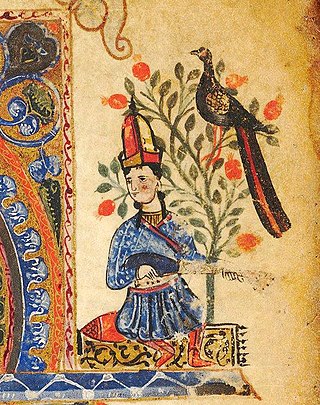
The music of Armenia has its origins in the Armenian highlands, dating back to the 3rd millennium BCE, and is a long-standing musical tradition that encompasses diverse secular and religious, or sacred, music. Folk music was notably collected and transcribed by Komitas Vardapet, a prominent composer and musicologist, in the late nineteenth and early twentieth centuries, who is also considered the founder of the modern Armenian national school of music. Armenian music has been presented internationally by numerous artists, such as composers Aram Khachaturian, Alexander Arutiunian, Arno Babajanian, Haig Gudenian, and Karen Kavaleryan as well as by traditional performers such as duduk player Djivan Gasparyan.

Mariss Ivars Georgs Jansons was a Latvian conductor, best known for his interpretations of Mahler, Strauss, and Russian composers such as Tchaikovsky, Rachmaninoff, and Shostakovich. During his lifetime he was often cited as among the world's leading conductors; in a 2015 Bachtrack poll, he was ranked by music critics as the world's third best living conductor. Jansons was long associated with the Bavarian Radio Symphony Orchestra and Royal Concertgebouw Orchestra as music director.

Soghomon Soghomonian, ordained and commonly known as Komitas, was an Ottoman-Armenian priest, musicologist, composer, arranger, singer, and choirmaster, who is considered the founder of the Armenian national school of music. He is recognized as one of the pioneers of ethnomusicology.

The culture of Armenia encompasses many elements that are based on the geography, literature, architecture, dance, and music of the Armenian people. Armenia is a majority Christian country in the Caucasus.
Arto Tunchboyachyan is an Armenian American avant-garde folk and jazz multi-instrumentalist and singer of Armenian descent. He fronts his own group called the Armenian Navy Band, and is also a member of the instrumental quartet Night Ark.

The Tölzer Knabenchor is a German boys' choir named after the Upper Bavarian city of Bad Tölz. Since 1971, the group has been based in Munich. The choir is internationally recognised for its programming and direction, having been nominated for a Grammy Award in 1983.
The Shoghaken Folk Ensemble is an Armenian musical group that performs and records Armenian folk and ashugh (troubadour) music. The ensemble was founded in 1991 in Yerevan. It has since performed in various countries, including France, Germany, Estonia, Russia, and the United Arab Emirates. In the US, they performed at an eighteen-concert 2004 tour and at the 2002 Folklife Festival as part of the Silk Road project organized by Yo-Yo Ma. The ensemble was also featured on the soundtrack to the Atom Egoyan film Ararat. In 2008, Shoghaken gave concerts during their second major tour of the US and Canada; the tour coincided with the release of the ensemble's latest CD, Shoghaken Ensemble: Music From Armenia.

The Kissinger Sommer is a classical music festival held every year in the summer in the city of Bad Kissingen in Bavaria, Southern Germany.
The Munich Radio Orchestra is a German symphony broadcast orchestra based in Munich. It is one of the two orchestras affiliated with the Bavarian Radio, the other being the Bavarian Radio Symphony Orchestra.

The Munich Chamber Orchestra is a German chamber orchestra based in Munich. Its primary concert venue is the Prinzregententheater, Munich. The MKO also gives concerts in Munich at such venues as the Pinakothek der Moderne and the Schwere Reiter, and at the Muffathalle during the Munich Biennale.
The ALEA Ensemble is a chamber music ensemble founded in 1988 in Graz for contemporary music, playing in variable formation including the ALEA Quartet.
The Gurdjieff Folk Instruments Ensemble based in Armenia was founded in 2008, and is led by the Armenian musician, Levon Eskenian. The Ensemble’s awards include the prestigious Dutch Edison Award: Best World Music Album 2012 and Armenian National Music Award: Best Folk Music Album 2011, for their album, “Music of Georges I. Gurdjieff,’’ produced by ECM Records. The ensemble consists of Armenia’s leading practitioners of traditional music performing on Duduk, Blul, Kamancha, Oud, Kanōn, Santur, Tar/Saz, Dap/Daf, Dhol, and Tombak. The repertoire is composed of the “mystic and spiritual teacher,” George I. Gurdjieff's Armenian, Greek, Assyrian, Arabic, Kurdish, Caucasian spiritual and folk music, authentically arranged for Eastern instruments by Eskenian. The repertoire also includes additional Eastern music that exemplifies Gurdjieff’s musical influences during his travels in the East.
Armenian folk music is a genre of Armenian music. It usually uses the duduk, the kemenche, and the oud. It is very similar to folk music in the Caucasus and shares many similar songs and traditions with countries around Armenia, namely Georgia and Azerbaijan.

The Moscow International Duduk Festival, MIDF is an international annual music festival of Armenian national musical instrument of Duduk held in Moscow.
Mkrtich Naghash was an Armenian painter, poet, and priest. He served as Archbishop of Diarbekr.

Wassily Gerassimez is a German cellist and composer.

Swallow Music Awards is an annual national music awards ceremony first held in Yerevan, Armenia, on 25 March 2017. The awards are created and sponsored by RA Ministry of Culture to appreciate and spur the activities of individuals and creators of various genres of Armenian musical art, as well as to display the significant achievements in the field of music to the broader layers of society. The awards consist of four parts: achievements in classical genre, folk genre, mass pop genre, and special/other awards. During the ceremony artists are given the awards designed by Armenian painter and designer Arman Nur. Each year, the award ceremony airs live on Public Television company of Armenia.

Elisabeth Brauss is a German pianist.
Konstantía Gourzí is a Greek composer and conductor. She is professor of ensemble conducting and new music at the University of Music and Performing Arts Munich.
Gitti Pirner is a German classical pianist and professor emeritus of the University of Music and Performing Arts Munich.











